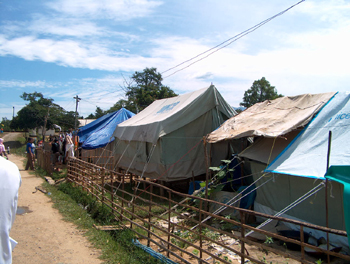|

One
of many tent cities in the tsunami devastated region
Aceh Clam Chowdah
(continued)
By Freeman Anthony
A few weeks later after the return from the North coast, these reflections
came more frequently on the "starting blocks" of the squat
toilets popular in equatorial climates. I'd been battling some stomach/intestinal
issues since the North Coast, which I attributed to the daily helpings
of spicy food that hid under a fly screen in the middle of the table,
day and night. I was on the mend on Simeulue, an island off the southwest
coast of Sumatra. The tsunami didn't hit here as hard as the mainland,
but an earthquake in March lifted the island up a meter and gave it
a good shake. After giving my stomach a few days to sort itself out,
I admitted gastrointestinal defeat to Rohan, who suggested I check with
Andrew at the Save the Children compound up the street that made our
office look like an isolated boarder crossing.
Andrew, a relief-work lifer on Simeulue who has been in the aid work
racket for 14 years and told of hard-knuckled stories over late night
coffee. We'd gather at one of the shanty cafes between the potholed
dirt road and the decomposing mangrove trees now high out of water for
good. He had hid under a house for three days in the last Bogonville
coup in PNG and spent two weeks in the bush after they got out. When
the poop hit the fan in East Timor he was forced to stay barred inside
for eight days while they hacked each other to bits outside. He said
he liked living life on the edge and felt like he was "just taking
up space" if things were otherwise. As for my stomach's life on
the edge, he checked his medical stash and referred me to a tent city
hospital outside Sinabang.
The original hospital structure is an eight-month old, three-story
building with open breezeways and green quadrangles between orange walls
and red brick roofs. There were stress cracks in the concrete at window
and doorway joints that look like less than surgical incisions in the
stucco finished exterior. In some places the maroon tiled walkways had
popped like fish scales. On one side, spread out on the asphalt parking
lot, were half a dozen white canvas tents, some with flaps waving in
the hot wind, others sealed particularly tight. In one open tent sat
a young doctor who appeared either tired or sun-beaten as she leaned
on her arm. She finished scribbling notes on a clipboard, gave me a
rough diagnosis of "ameboic dysentry" and pawed through boxes
of donated pills for an appropriate dose of amoeba-killer.
Within two hours I felt good enough to go out to dinner with a female
ex-pat, much to the interest of all eight of our national staff, who
gleefully picked us up at the UN World Food Programme tent. Marte was
from the Norwegian Red Cross, who had already completed a couple successful
water projects on the island. We had met a week earlier over a cigarette
after the water and sanitation group meeting in Banda Aceh and were
both looking at new projects on the island, as well as any good diving
that might be around.
|